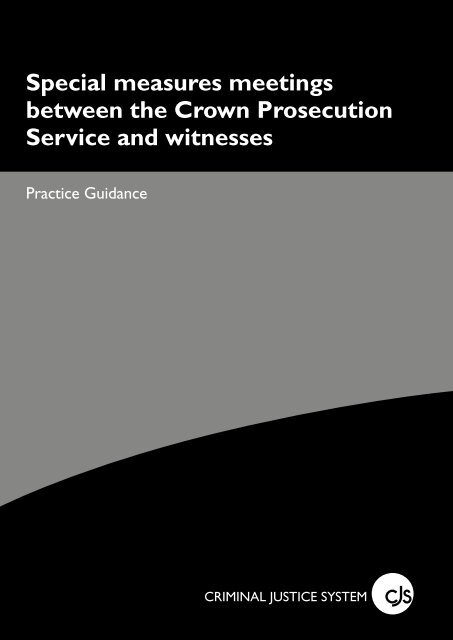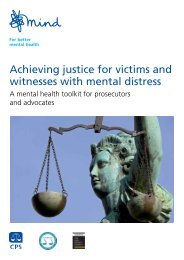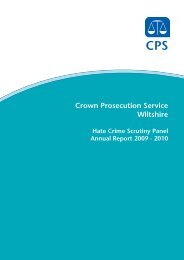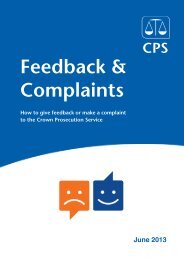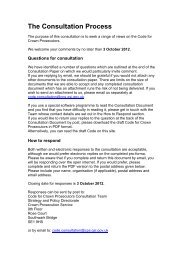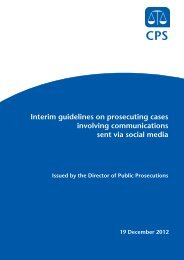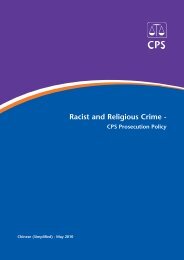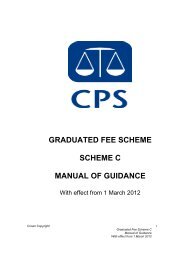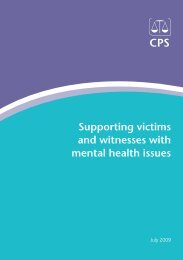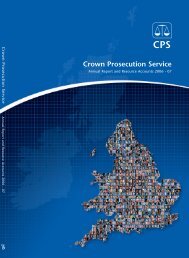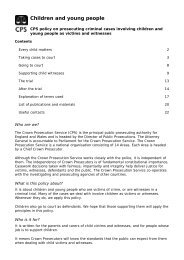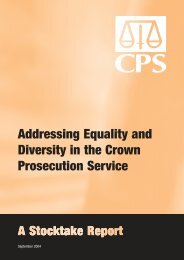Special measures - Crown Prosecution Service
Special measures - Crown Prosecution Service
Special measures - Crown Prosecution Service
Create successful ePaper yourself
Turn your PDF publications into a flip-book with our unique Google optimized e-Paper software.
Keeping a record of the meeting 12What should be discussed at the meeting 12Change in needs or circumstances of the witness 13After the meeting 14Annex A: Eligibility for special <strong>measures</strong> 15Annex B: <strong>Special</strong> <strong>measures</strong>: witness eligibility 16Annex C: Child witnesses: eligibility for special<strong>measures</strong> 17Annex D: Provisions restricting defendants fromcross-examining certain witnesses in person 18Annex E: Witness Care Units 19Annex F: <strong>Special</strong> <strong>measures</strong> meetings between the<strong>Crown</strong> <strong>Prosecution</strong> <strong>Service</strong> and witnesses 20Annex G: Timescales for special <strong>measures</strong> applications 21Annex H: Pre-trial therapy 22Annex I: Record keeping 242 <strong>Special</strong> <strong>measures</strong> meetings between the <strong>Crown</strong> <strong>Prosecution</strong> <strong>Service</strong> and witnesses
The Prosecutors’ PledgeThe Prosecutors’ Pledge, published in October 2005,complements the Victims’ Code. The Pledge detailsthe level of service victims can expect to receivefrom prosecutors.The Pledge includes ten commitments. Thefollowing commitment is of particular relevancewhen considering whether the prosecutor shouldmeet with the witness to discuss special <strong>measures</strong>:“address the specific needs of a victim and wherejustified seek to protect their identity by making anappropriate application to the court”.The CPS prosecutor will consider the VictimPersonal Statement, which details the impact ofthe crime on the victim, when deciding whetherto charge the accused with an offence. The CPSprosecutor will discuss with the police officerwhether the victim is eligible for special <strong>measures</strong>.The CPS prosecutor is able to apply to the courtfor a range of special <strong>measures</strong>. The prosecutorshould ensure that the witness’s views are takeninto account and will, if required, meet with thewitness to discuss them.<strong>Special</strong> <strong>measures</strong>Sections 23–30 of the 1999 Act provide for amenu of special <strong>measures</strong> to enable vulnerable orintimidated witnesses in a criminal trial to givetheir best evidence. 2 The table at Annex Aprovides information about the eligibility ofvulnerable and intimidated witnesses for special<strong>measures</strong>. Annex B details the witness eligibilitycriteria for special <strong>measures</strong>.Sections 21 and 22 of the 1999 Act set out certainpresumptions that apply in respect of childwitnesses under the age of 17 (Annex C providesfurther information).Sections 34–36 of Part II of the 1999 Actprohibit, or provide the court with the powerto prohibit, cross-examination by defendants inperson in respect of certain specified witnesses,such as children and complainants in sexualoffence cases (Annex D provides furtherinformation).2The special <strong>measures</strong> available under the 1999 Act are: video-recorded evidence in chief; live links; screens around the witnessbox; evidence given in private (clearing the public gallery); removal of wigs and gowns; video-recorded cross-examination (NBnot yet implemented); examination of the witness through an intermediary; and aids to communication. For further detailsabout the menu of special <strong>measures</strong> see Early special <strong>measures</strong> discussions between the police and the <strong>Crown</strong> <strong>Prosecution</strong> <strong>Service</strong>,which is available from the CPS website (www.cps.gov.uk).4 <strong>Special</strong> <strong>measures</strong> meetings between the <strong>Crown</strong> <strong>Prosecution</strong> <strong>Service</strong> and witnesses
Case studyOn the evening of 2 September 2007, Alison was celebrating her friend’s birthday. She wentto the local public house and then on to a disco. She consumed eight alcoholic drinks anddescribed herself as “drunk and happy”.Whilst at the disco, Alison noticed a man staring at her. The man, Paul, approached her andengaged her in conversation. She described Paul as being pleasant and not aggressive in hisconversation.Paul offered to drive Alison home. They walked to Paul’s car and chatted amiably. Thejourney to her house lasted approximately 15 minutes. On the way to her house, Paulsexually assaulted her.After the assault, Paul pulled Alison out of the car onto the pavement. He then drove off.Alison states that she lay on the pavement, in a state of shock, until a witness found her andtelephoned the police.Alison was examined by a doctor at the police station. The doctor found fresh reddening onher upper arms. There were no other injuries on her body. A vaginal swab was taken and theDNA matched Paul’s.Alison gave her account to the police by way of a video-recorded interview.Paul was arrested later that day. In interview, he stated that he had consensual sex withAlison in his car, at her request. He denied using any force and said that he had no injurieson him. He consented to be examined by a doctor. No injuries were found on him.The police submitted a file of evidence to the CPS. The file was reviewed by the rapespecialist prosecutor, who advised that there was sufficient evidence to proceed with thecase. The CPS prosecutor decided that it was appropriate to meet with Alison to discuss thespecial <strong>measures</strong> available to her. She agreed to meet the CPS prosecutor.At the special <strong>measures</strong> meeting, the CPS prosecutor informed Alison that, as she was acomplainant in a serious sexual case, she was automatically entitled to special <strong>measures</strong>upon application of the prosecution. The prosecutor informed her of the range of special<strong>measures</strong>, including the option of having her video-recorded evidence played as evidence inchief. The prosecutor explained the advantages and disadvantages of each of the availablespecial <strong>measures</strong>. Alison was asked to express her view as to which, if any, special <strong>measures</strong>should be applied for by the prosecution.Alison stated that she was particularly fearful of having to be questioned by Paul in court.The prosecutor explained that this would not happen as sections 36–37 of Part II of theYouth Justice and Criminal Evidence Act 1999 prohibit, or provide the court with the powerto prohibit, cross-examination of victims in sexual cases by unrepresented defendants.<strong>Special</strong> <strong>measures</strong> meetings between the <strong>Crown</strong> <strong>Prosecution</strong> <strong>Service</strong> and witnesses 5
Police officers and CPS prosecutors must notassume that a witness will want special <strong>measures</strong>,or a particular special measure. Also, policeofficers and CPS prosecutors must take intoaccount that a witness may initially say that theydo not require special <strong>measures</strong>, but may laterrealise that they do but are reluctant to say so.A witness’s need for special <strong>measures</strong> should bekept under review throughout the criminal justiceprocess by the police officer in the case and theCPS prosecutor.Police officers and CPS prosecutors shoulddiscuss, as early as possible, whether a witnessmay benefit from special <strong>measures</strong>. Police officersmust inform CPS prosecutors of the witness’sviews about special <strong>measures</strong> (via the MG formsand early special <strong>measures</strong> discussions). This willenable the CPS prosecutor to make timely andinformed decisions about important issues, such asapplying for special <strong>measures</strong>, including theappointment of an intermediary. It is important tonote that the decision to order special <strong>measures</strong>rests with the court and so witness expectationsmust be managed effectively throughout theprocess.Following the early special <strong>measures</strong> discussion,the police officer should ask the witness whether,if they are required to give evidence, they wish tomeet the CPS prosecutor. The purpose of thatmeeting is to discuss matters relating to special<strong>measures</strong> decisions.The CPS prosecutor must inform the WitnessCare Unit (WCU) of the applications made forspecial <strong>measures</strong>, as well as the direction made bythe court 3 (further information concerning WCUsis at Annex E).Witness special <strong>measures</strong>meetings<strong>Special</strong> <strong>measures</strong> meetings focus on supportingeligible witnesses to give their best evidence. 4The meetings:•establish a link between the CPS and thewitness;• provide an opportunity for the CPS prosecutorto reassure the witness that their needs will betaken into account; 5•allow the CPS prosecutor to supply clear andaccurate information to the witness;• provide an opportunity for the witness toexplain their concerns about giving evidenceand ask questions about the availability ofspecial <strong>measures</strong>;•may reduce the reluctance of witnesses toparticipate in the Criminal Justice System;• may improve the CPS prosecutor’sunderstanding of the witness’s view of special<strong>measures</strong>; and•improve the trial process, as CPS prosecutorsapply for the special <strong>measures</strong> that will bestmeet the witness’s needs.The special <strong>measures</strong> meeting may provide anopportunity to assess any further needs of thewitness when giving evidence. Such an assessmentmust be carried out without entering into anydiscussion of the evidence. If there are doubtsabout the reliability of the witness’s evidence, apre-trial witness interview should be held. 63Paragraph 8.3(b) of The Code of Practice for Victims of Crime states that Her Majesty’s Courts <strong>Service</strong> must “in relation to all laterhearings… ensure that, in cases which the court staff have been notified involve vulnerable or intimidated victims, decisions reach thejoint police/CPS Witness Care Units no later than one working day after the day on which the decision is made; and in cases involvingother victims, decisions reach the joint police/CPS Witness Care Units no later than three working days after the day on which the decisionis made”.4A separate meeting must be held for each witness for whom special <strong>measures</strong> are under consideration.5There should be a locally agreed process in place to ensure that the WCU is informed about special <strong>measures</strong>.6See the Code of Practice for Pre-trial Witness Interviews, which applies to interviews for the purpose of assisting a prosecutor toassess the reliability of a witness’s evidence or to understand complex evidence.6 <strong>Special</strong> <strong>measures</strong> meetings between the <strong>Crown</strong> <strong>Prosecution</strong> <strong>Service</strong> and witnesses
The meeting can also be an opportunity for theCPS prosecutor to explain why a decision hasbeen taken not to apply for special <strong>measures</strong>.If the meeting does not coincide with the precourtfamiliarisation visit, which will usually beconducted by Witness <strong>Service</strong> volunteers, anexplanation of court procedure and the rolesof the various parties in the trial may be given.The meetings assist the CPS prosecutor and thewitness. In appropriate cases, an intermediary mayalso be required to attend the meeting in order tofacilitate communication between the CPSprosecutor and the witness.When should the meeting withthe witness take place?It is preferable for the meeting with the witnessto be held before an application for special<strong>measures</strong> is made to the court. This will allow theCPS prosecutor to confirm the views of thewitness as to which of the special <strong>measures</strong>should be applied for. The CPS prosecutor is thenable to make a fully informed application to thecourt (Annex F indicates the purpose and benefitsof meetings held before applying for special<strong>measures</strong>).In certain cases, it may only be possible to meetwith the witness after an application for special<strong>measures</strong> has been made to the court. Thismeeting may be timed to coincide with the precourtfamiliarisation visit. The meeting wouldpermit the witness to see and be reassured by thespecial <strong>measures</strong> available, such as the live linkroom (Annex F provides details of the purpose ofmeetings held after applying for special <strong>measures</strong>).When considering when to hold a meeting with awitness, CPS prosecutors must note the following:• the meeting should be held after the defendanthas been charged with an offence;•the meeting should not take place until thewitness has made a statement, or furtherstatement, which was discussed at the earlyspecial <strong>measures</strong> discussion with the policeofficer; 7 and• the tighter timescales in the magistrates’ andyouth courts mean that meetings withwitnesses will need to be held as soon aspossible after the entry of a not guilty plea(see Annex G).7See Practice Guidance Early special <strong>measures</strong> discussions between the police and the <strong>Crown</strong> <strong>Prosecution</strong> <strong>Service</strong>.<strong>Special</strong> <strong>measures</strong> meetings between the <strong>Crown</strong> <strong>Prosecution</strong> <strong>Service</strong> and witnesses 7
Which witnesses are eligible toattend a meeting with the CPSprosecutor?Vulnerable and intimidated witnesses (as definedby sections 16 and 17 of the 1999 Act) for whomthe CPS intends to make an application for special<strong>measures</strong> will be offered a meeting with the CPSprosecutor. Witnesses in respect of whom theCPS has decided not to apply for a specialmeasure(s) may also request a meeting with theCPS prosecutor if they are unhappy with thatdecision (Annex B provides details of thewitnesses eligible for special <strong>measures</strong>).How will the eligible witnessesbe offered a meeting with theCPS prosecutor?The police officer in the case should take allreasonable steps to identify whether the witnessis vulnerable or intimidated. 8 The police officershould explain to the witness the provision ofspecial <strong>measures</strong>, and record the witness’s viewsabout applying for special <strong>measures</strong>. The policeofficer should then discuss, during an early special<strong>measures</strong> discussion with the CPS prosecutor, theneeds of the witness and the eligibility of thewitness for special <strong>measures</strong>. Following the earlyspecial <strong>measures</strong> discussion, the police officershould contact the witness to inform them of theCPS prosecutor’s decision about special <strong>measures</strong>.The police officer should ask the witness whether,if they are required to give evidence, they wish tohave a meeting with the prosecutor to discuss anymatter arising from the early special <strong>measures</strong>discussion. The witness may decide not to meetthe CPS prosecutor. The witness’s decision shouldbe respected.8It is important that the police officer informs the CPS prosecutor whether the witness is receiving pre-trial therapy, or it isproposed that they do so, or that it has been undertaken (see Annex H).8 <strong>Special</strong> <strong>measures</strong> meetings between the <strong>Crown</strong> <strong>Prosecution</strong> <strong>Service</strong> and witnesses
Who should attend the meetingwith the witness?CPS prosecutors must consider each caseindividually, and the needs and wishes of thewitnesses must be taken into account. The finaldecision as to who will attend the meeting restswith the CPS prosecutor, after appropriatediscussion and liaison with those concerned.When considering who should attend the meetingwith the witness, CPS prosecutors must aim toprovide the maximum possible continuity for thewitness. Consideration must be given to, wherepossible, the witness meeting the same membersof the prosecution team throughout the trialprocess.When arranging the meeting, consideration shouldbe given to the number of attendees. It isrecommended that the number of attendees islimited to the witness and a maximum of fourothers. Consideration should be given to theattendance of the following people:• the CPS reviewing lawyer;• the trial advocate;9• counsel;10• the CPS caseworker;• the police officer in the case;11• the witness;•a relative, carer or supporter of the witness,such as an Independent Domestic ViolenceAdvisor; and• a person who may be required to facilitatecommunication with the witness for thepurpose of the meeting, for example anintermediary.If the witness wishes a legal representativeto attend the meeting, this should usually bepermitted. It will be the responsibility of thewitness to make the arrangements for theattendance and payment of the legalrepresentative.The CPS will pay reasonable expenses andallowances incurred by the witness attending themeeting (other than any legal representative of thewitness), in accordance with the <strong>Crown</strong><strong>Prosecution</strong> <strong>Service</strong> (Witnesses’ etc. AllowancesRegulations 1988). The Witness Care Officer willsend the expenses form to the witness in advanceof the meeting. Where the Witness Care Officer isnot the single point of contact for the witness,arrangements must be made locally to ensure thatthe witness is supplied with an expenses form.9Whenever possible, the trial advocate should be present at the meeting and, if not the same person, the CPS prosecutor whowas present at the early special <strong>measures</strong> discussion.10If counsel has been, or is to be, instructed to prosecute the case, they should, wherever possible, attend the meeting.11If the police officer in the case has not had the contact with the vulnerable or intimidated witness, then the officer who has hadsuch contact should also attend.<strong>Special</strong> <strong>measures</strong> meetings between the <strong>Crown</strong> <strong>Prosecution</strong> <strong>Service</strong> and witnesses 9
Where will the meetingtake place?The meeting can be held at a CPS office, a policestation or the courthouse at which the case willbe tried. 12 CPS prosecutors should consider thepossibility of holding the meeting at anotherlocation, such as social services premises, if thewitness has particular needs. In some cases, it maybe necessary for the meeting to be carried out byway of a remote link.When deciding where to hold the meeting, theneeds of the witness must be taken into account.Meeting with the witness at the CPS officeCPS prosecutors should consider the benefit tothe witness of arranging for the meeting to beheld at the CPS office. A quiet room at a CPSoffice will provide an environment in which theCPS prosecutor can explain, without interruption,special <strong>measures</strong> decisions and listen to theconcerns of the witness.If the meeting with the witness is held at the CPSoffice, the witness may ask for an explanation ofcourt procedure and the roles of those involved.If this happens, the CPS prosecutor should give anexplanation whilst avoiding any discussion of theevidence. The explanation is not intended toreplace the work of the Witness Care Unit orthe Witness <strong>Service</strong>.Meeting with the witness at police premisesCPS prosecutors must consider that the witnessmay be familiar with the environment of the policestation and may opt for this venue for themeeting.CPS prosecutors should always be alert to thepossibility of holding a meeting at the policestation. This option is of particular relevancewhere there are personal safety issues to beconsidered.Meeting with the witness at the courthouseIt may be possible to arrange for the meeting tobe on a day and at a time which will coincide withthe pre-court familiarisation visit organised by theWitness <strong>Service</strong>. The pre-court familiarisation visitis invaluable for many witnesses, as it enables themto familiarise themselves with the layout of thecourt. During the visit, the witness should, wherepossible, have the opportunity to have ademonstration of the special <strong>measures</strong> for whichthey are eligible. The demonstration shouldinclude, for example, the use of the live link andan explanation as to who will be able to see thewitness in the courtroom, and showing the useof screens (where it is practicable and convenientto do so). If it is not possible to arrange ademonstration, the special <strong>measures</strong> should befully explained to the witness in order to avoidany misunderstandings. The pre-courtfamiliarisation visit makes witnesses betterinformed about the particular special <strong>measures</strong>that may assist them to give evidence.If the meeting is to be held on the same day asthe pre-court familiarisation, CPS prosecutorsshould consider the possibility of allowing a breakbetween their meeting with the witness and thewitness meeting the Witness <strong>Service</strong>. This will beof benefit to the witness as it will allow themsufficient time to consider the environment andthe information supplied to them, as well asavoiding the need to set aside two days for twomeetings.If it is decided that the CPS prosecutor will meetthe witness on the day of the pre-courtfamiliarisation visit, this will avoid a potentialduplication of work. As part of the pre-courtfamiliarisation visit, the Witness <strong>Service</strong> willexplain to the witness the court procedure andthe roles of the parties in the trial process, andoffer support to the witness.12CPS staff involved in a meeting with a witness should consider their personal safety by following the guidance contained in theCPS Health and Safety Manual. Section 11 provides guidance on health and safety best practice concerning victims and witnesscare on CPS premises. The Manual can be found on the CPS Infonet.10 <strong>Special</strong> <strong>measures</strong> meetings between the <strong>Crown</strong> <strong>Prosecution</strong> <strong>Service</strong> and witnesses
Arranging the meetingThe witness’s single point of contact will arrangethe meeting. If a Witness Care Officer has beenassigned as the single point of contact, the WitnessCare Unit will arrange the meeting.The Witness Care Unit will seek the views of thewitness as to the venue for the meeting, but thefinal decision will be made by the CPS prosecutor.The Witness Care Unit will inform the witness ofthe venue for the meeting as soon as possible.If the police station is chosen as the venue for themeeting, the Witness Care Unit will liaise with theofficer in the case to arrange the allocation of anappropriate room.If the meeting is to be held at the courthouse, theWitness Care Unit will liaise with the Witness<strong>Service</strong> to co-ordinate the arrangements andwill also discuss the request of the witness fora pre-trial familiarisation visit.The Witness Care Unit will provide the witnesswith a leaflet 13 to explain the purpose of themeeting with the CPS prosecutor. This will informthe witness, in advance of the meeting, that it willnot be possible to discuss the evidence of thewitness or any other evidential aspect of the case.The provision of the leaflet will avoid thepossibility of the witness having expectations thatare not met.The need to avoid rehearsingor coaching the witnessIt is imperative that there is no discussion withthe witness as to the evidence in the case. It ispossible that the witness will wish to mention ordiscuss a matter relating to evidence. Such adiscussion could lead to an allegation of rehearsingor coaching of the witness, as well as theexclusion of evidence.Prosecutors must be alert to the case of R vMomodou and R v Limani [2005] EWCA Crim 177.Prosecutors must not under any circumstancestrain or coach the witness. CPS prosecutors mustnot ask questions that may taint the witness’sevidence.This case establishes that there is a dramaticdistinction between witness training or coaching,and witness familiarisation. Training or coaching forwitnesses in criminal proceedings is not permitted.This principle does not preclude pre-trialarrangements to familiarise witnesses with thelayout of the court, the likely sequence of eventswhen the witness is giving evidence, and abalanced appraisal of the different responsibilitiesof the various participants. Such arrangements,usually in the form of a pre-trial visit to the court,are generally to be welcomed.If the witness does wish to discuss an evidentialmatter, the CPS prosecutor must explain that thewitness must discuss his or her evidence with thepolice officer, not the prosecutor. The CPSprosecutor must arrange for this to happen. TheCPS prosecutor must also make a writtenrecord 14 of what was said by the witness and theaction taken by the CPS prosecutor. 1513About your meeting with the CPS Prosecutor14See the section “Keeping a record of the meeting”.15The record must be made in writing. The officer in the case must include the details of the written note on the form MG6C.The MG6C must be supplied to the CPS. The CPS must disclose the MG6C to the defence. The MG6C should be disclosedwithout a specific request from the defence to do so. If the written note contains sensitive material, the officer in the case mustinclude details of the note on the form MG6D. Issues concerning the disclosure of the MG6D form must be determined inaccordance with the usual Criminal Procedure and Investigation Act 1996 principles, the Attorney General’s guidelines ondisclosure and public interest immunity procedures.<strong>Special</strong> <strong>measures</strong> meetings between the <strong>Crown</strong> <strong>Prosecution</strong> <strong>Service</strong> and witnesses 11
Keeping a record of the meetingIt is essential that a contemporaneous writtenrecord is kept of what is discussed and agreedwith the witness at the meeting. A CPS employeeshould be appointed as the designated note-takerfor this purpose. Annex I provides details of whatinformation should be recorded.The meeting attendees, with the exception of thewitness, should be asked to sign the record of themeeting as being a correct record of what wasdiscussed.The officer in the case must include the details ofthe written record on the MG6C form, whichmust be supplied to the CPS (see footnote 16).It is vital that the matters discussed at the meetingare sufficiently recorded. The written record mayavoid the CPS prosecutor being called as a witnessat the trial and, in the event of being called, willprovide an aide-memoire.It must be noted that the meetings with witnessesmay be tape-recorded or video-recorded if thecircumstances of the case justify this action. CPSprosecutors make a written note of the reason(s)for deciding to tape/video-record the meeting.The same principles of disclosure, as detailed atfootnote 16, will apply to the written note and therecord of the tape/video-recorded meeting.What should be discussed atthe meetingCPS prosecutors must consider each case on anindividual basis, but the following matters shouldbe included in the discussion:• an explanation to the witness of the purposesof the meeting;• an explanation as to the prosecutor’s role;16•an explanation to the witness that it will not bepossible to discuss the evidence of the witnessor any other matter relating to the evidence inthe case;• if appropriate, an explanation to the witness ofthe provisions contained in sections 34–36 ofthe 1999 Act;•an explanation to the witness that, although arelative, carer or supporter has attended themeeting with the witness, such a person will notnecessarily be permitted to sit in the witnessbox with the witness; and• if the witness asks and if the meeting does notcoincide with the pre-court familiarisation visitorganised by the Witness <strong>Service</strong>, anexplanation of court procedure and the rolesof the various parties in the trial.Where the CPS prosecutor has decided not toapply for any special <strong>measures</strong>, or to apply forspecial measure(s) that differ from those preferredby the witness, at the meeting they must providean explanation to the witness of the reasons forthat decision.Where the meeting takes place before theapplication for special <strong>measures</strong> is made to thecourt, the CPS prosecutor should:16Paragraph 5.12 of the Code for <strong>Crown</strong> Prosecutors states: “The <strong>Crown</strong> <strong>Prosecution</strong> <strong>Service</strong> does not act for victims or the families ofvictims in the same way as solicitors act for their clients. <strong>Crown</strong> Prosecutors act on behalf of the public and not just in the interests of anyparticular individual. However, when considering the public interest, <strong>Crown</strong> Prosecutors should always take into account the consequencesfor the victim of whether or not to prosecute, and any views expressed by the victim or the victim’s family.”12 <strong>Special</strong> <strong>measures</strong> meetings between the <strong>Crown</strong> <strong>Prosecution</strong> <strong>Service</strong> and witnesses
• explain to the witness the special <strong>measures</strong> thatwere identified at the early special <strong>measures</strong>discussion with the police officer;•discuss with the witness the special <strong>measures</strong>identified and check that those special <strong>measures</strong>are appropriate for an application to thecourt for a special <strong>measures</strong> direction undersection 19 of the 1999 Act;• seek the views of the witness as to which ofthe special <strong>measures</strong> they would prefer to have;•explain to the witness that the defendant’s legalrepresentatives have a duty to promote thebest interests of the defendant, and that theymay contest the use of special <strong>measures</strong>; and• explain to the witness that the court will makethe final decision as to what special <strong>measures</strong>will be made available to the witness at the trial.In reaching that decision, the court will take thewishes of the witness into account and alsoconsider whether the <strong>measures</strong> tend to inhibitthe effective testing of the evidence of thewitness by the defendant (section 19(3) of the1999 Act).Change in needs orcircumstances of the witnessThe needs or circumstances of a witness may,indeed often will, change from the reporting of thecrime to the court hearing. The CPS prosecutorshould ask the witness to contact the WitnessCare Unit or, if appropriate, their single point ofcontact, if their needs or circumstances change ina way that might affect the decision not to applyfor special <strong>measures</strong> or the special <strong>measures</strong>already applied for. If it is necessary to make anapplication or a further application to the courtfor special <strong>measures</strong>, the CPS prosecutor shoulddo so as soon as possible (see section 20 of the1999 Act).Where the meeting takes place after theapplication to the court for special <strong>measures</strong>is made, CPS prosecutors must:• inform the witness and those involved of thespecial <strong>measures</strong> directed by the court to applyto the trial; and•explain the binding effect of the court’sdirection (section 20 of the 1999 Act).Where the CPS prosecutor has decided not toapply for any special <strong>measures</strong>, an explanationshould be given to the witness of the reasons forthat decision. The CPS prosecutor must take intoaccount any comments or views expressed by, oron behalf of, the witness and, if appropriate,reconsider the decision not to apply for special<strong>measures</strong>.<strong>Special</strong> <strong>measures</strong> meetings between the <strong>Crown</strong> <strong>Prosecution</strong> <strong>Service</strong> and witnesses 13
After the meetingFollowing the meeting, CPS prosecutors must:•inform the Witness Care Unit of the outcomeof the meeting;• notify the defence that a meeting has takenplace; and•send a copy of the relevant MG forms to thedefence, unless they contain sensitive material.14 <strong>Special</strong> <strong>measures</strong> meetings between the <strong>Crown</strong> <strong>Prosecution</strong> <strong>Service</strong> and witnesses
Annex AYouth Justice and Criminal Evidence Act 1999: eligibility for special<strong>measures</strong> (England and Wales)Section 23screening witness fromaccusedSection 24evidence by live linkSection 25evidence given inprivateSection 26removal of wigs andgownsSection 27video-recordedevidence in chiefSection 28video-recordedcross-examination/re-examinationSection 29examination throughan intermediarySection 30aids to communicationSection 16witnesses(children)Section 16witnesses(vulnerable adults)Section 17witnesses(intimidated/fearor distress) 17Eligible Eligible EligibleEligible 18 Eligible EligibleOnly in sexual offencecases and casesinvolving witnessintimidationOnly in sexual offencecases and casesinvolving witnessintimidationOnly in sexual offencecases and casesinvolving witnessintimidationEligible Eligible EligibleEligible 18 Eligible EligibleNot yet implemented Not yet implemented Not yet implementedEligible Eligible Not eligibleEligible Eligible Not eligible17Complainants of sexual offences will be considered eligible for special <strong>measures</strong> unless they inform the court that they do notwant to be eligible.18There is a presumption that most child witnesses will have a video-recording admitted as their evidence in chief and will givefurther evidence or cross-examination through a live link at trial – unless giving in evidence in this way would not improve thequality of the child’s evidence. Stronger presumptions that their evidence will be given in this way apply in cases where childrenare deemed in need of “special protection”, i.e. witnesses in sexual offence cases and those involving violence, cruelty, abductionor neglect.<strong>Special</strong> <strong>measures</strong> meetings between the <strong>Crown</strong> <strong>Prosecution</strong> <strong>Service</strong> and witnesses 15
Annex B<strong>Special</strong> <strong>measures</strong>: witness eligibilityWitnesses are eligible for special <strong>measures</strong> to helpthem give evidence on one or more of thefollowing grounds:Vulnerable witnesses (section 16 of the1999 Act)These are people who:• are under 17 years of age at the time of thehearing; or•suffer from a mental disorder; or have asignificant impairment of intelligence and socialfunctioning, that the court considers likely todiminish the quality of their evidence. This mightcover, for example, autistic spectrum disorders;or• have a physical disorder or disability, includingdeafness, that the court considers likely todiminish the quality of their evidence.Intimidated witnesses (section 17 of the1999 Act)These are people who the court is satisfiedare likely to suffer fear or distress at theprospect of giving evidence, because of theirown circumstances and those of the case, to anextent that is expected to diminish the qualityof their evidence.A number of factors are set out in section 17which the court should have regard to whendetermining eligibility under this section.16 <strong>Special</strong> <strong>measures</strong> meetings between the <strong>Crown</strong> <strong>Prosecution</strong> <strong>Service</strong> and witnesses
Annex CChild witnesses:eligibility for special <strong>measures</strong>Sections 21 and 22 of the 1999 Act detail somespecial provisions for child witnesses under theage of 17. The provisions create strongpresumptions that apply to certain categories ofchild witnesses and concern how they will givetheir evidence. The provisions state:• where there is a child witness in a sexualoffence case or one involving violence,abduction or neglect, the child witness isdeemed to be “in need of special protection”.In such cases, the court does not have toconsider whether the special measure(s) willimprove the quality of the evidence; this willbe assumed to be the case;•all child witnesses in need of special protectionwill have the video-recording of their evidenceadmitted as evidence in chief, unless this isexcluded by the court on the basis that toadmit the video-recording would not be in theinterests of justice;• child witnesses in sexual or violent cases willnormally be cross-examined and re-examinedvia the live link; and•for all other child witnesses there will bepresumption that evidence in chief will be givenby playing the video-recording, if one has beenmade, and that cross-examination andre-examination will be via the live link. However,the court will need to be satisfied that this willimprove the quality of the evidence.In cases involving children, prosecutors must bealert to the case of R v Camberwell Youth Court andOthers [2005] UKHL 4. 1919The House of Lords in R v Camberwell Youth Court and Others [2005] UKHL 4 held that the presumption for children in need ofspecial protection did not breach Articles 6 or 14 of the European Convention on Human Rights. It also clearly stated that thenorm for child witnesses giving evidence was by video evidence in chief (where one has been recorded) and live link for crossexamination.This applies equally to child witnesses for the prosecution and defence.<strong>Special</strong> <strong>measures</strong> meetings between the <strong>Crown</strong> <strong>Prosecution</strong> <strong>Service</strong> and witnesses 17
Annex DProvisions restricting defendantsfrom cross-examining certainwitnesses in personSection 34 of Part II of the 1999 Act prohibits thecross-examination in person by unrepresenteddefendants of complainants in sexual cases.Section 35 of Part II of the 1999 Act prohibits thecross-examination in person by unrepresenteddefendants of certain “protected witnesses”, suchas child complainants and other child witnesses.Section 36 of Part II of the 1999 Act permits acourt to make an order prohibiting the crossexaminationin person by defendants of a witnesswhere the prohibitions in sections 34 and 35 donot apply, such as for certain intimidatedwitnesses.18 <strong>Special</strong> <strong>measures</strong> meetings between the <strong>Crown</strong> <strong>Prosecution</strong> <strong>Service</strong> and witnesses
Annex EWitness Care UnitsWitness Care Units (WCUs) are jointly operatedby the police and the CPS. The units are staffed byWitness Care Officers (WCOs) who provideinformation and access to support to victims andwitnesses from the point of charge through tocase completion.Dedicated WCOs act as a single point of contactfrom the point of charge in the majority of cases.In some cases (such as child abuse, domesticviolence and rape), a specialist police officer mayact as the single point of contact, and they mayrefer the witness to a support service such as anIndependent Domestic Violence Advisor or anIndependent Sexual Violence Advisor. The singlepoint of contact will keep victims and witnessesinformed about the progress of the case via theirpreferred means of contact. This includes theoutcome of the case and thanking them for theirtime and contribution.WCOs also undertake a detailed needsassessment of each victim and witness. Thisprovides an in-depth understanding of anindividual’s needs and requirements. The WCOsthen have at their disposal a range of interventionsto provide tailored support to those victims andwitnesses who need it.<strong>Special</strong> <strong>measures</strong> meetings between the <strong>Crown</strong> <strong>Prosecution</strong> <strong>Service</strong> and witnesses 19
Annex F<strong>Special</strong> <strong>measures</strong> meetings between the <strong>Crown</strong> <strong>Prosecution</strong><strong>Service</strong> and witnessesMeeting with the witness before theapplication to the court for special<strong>measures</strong>Purpose:The CPS prosecutor can:• confirm that the special <strong>measures</strong> which wereidentified at the early special <strong>measures</strong>discussion with the police officer areappropriate for an application to the court fora special <strong>measures</strong> direction (section 19 of the1999 Act); and• confirm the views of the witness as to whichof the special <strong>measures</strong> should be applied for(section 19 of the 1999 Act requires the courtto consider any views expressed by the witness).Benefits:• The CPS prosecutor is able to speak directlyto the witness about their wishes for special<strong>measures</strong>.• The CPS prosecutor is able to make a fullyinformed application to the court for special<strong>measures</strong>.• The CPS prosecutor may identify othermethods of support to enable the witness togive evidence.• The witness has an opportunity to inform theCPS prosecutor of their concerns about givingevidence.• The witness is informed, at an early stage, ofwhich special <strong>measures</strong> will be applied for.• The witness meets the CPS at an early stagein the proceedings.• The witness is accurately informed andreassured of their role in the proceedings.Meeting with the witness after theapplication to the court for special<strong>measures</strong> is madePurpose:The CPS prosecutor should:• inform the witness of the special measure(s)directed by the court to apply to the trial;• explain the binding effect of the court’sdirection (section 20 of the 1999 Act); and• explain, where necessary, why a decision hasbeen taken not to apply for special <strong>measures</strong>.Benefits:• The witness has contact with the CPS prior tothe trial hearing.•The CPS prosecutor can provide clear andaccurate information to the witness aboutspecial <strong>measures</strong> directed by the court.• The witness understands which special<strong>measures</strong> will be available for them on the dayof the trial, and the reasons why.•The witness is fully informed of the progressof the case.• The meeting may coincide with the pre-courtfamiliarisation visit, permitting the witness tosee and be reassured by the special <strong>measures</strong>available, such as the live link room.20 <strong>Special</strong> <strong>measures</strong> meetings between the <strong>Crown</strong> <strong>Prosecution</strong> <strong>Service</strong> and witnesses
Annex GTimescales for special <strong>measures</strong>applicationsApplication to the youth courtWithin 28 days of the date on which thedefendant first appears or is brought before thecourt in connection with the offence.Application to a magistrates’ courtWithin 14 days of the defendant indicating theirintention to plead not guilty to any charge broughtagainst them and in relation to which a special<strong>measures</strong> direction may be sought.Application to the <strong>Crown</strong> CourtWithin 28 days of:(i) the committal of the defendant, or(ii) the consent to the preferment of a bill ofindictment in relation to the case, or(iii) the service of a notice of transfer undersection 53 of the Criminal Justice Act 1991, or(iv) where a person is sent for trial under section51 of the Crime and Disorder Act 1998, theservice of copies of the documents containingthe evidence on which the charge or chargesare based under paragraph 1 of Schedule 3 tothat Act, or(v) the service of a Notice of Appeal from adecision of a youth court or a magistrates’court.<strong>Special</strong> <strong>measures</strong> meetings between the <strong>Crown</strong> <strong>Prosecution</strong> <strong>Service</strong> and witnesses 21
Annex HPre-trial therapyThe best interests of the vulnerable orintimidated witness are paramount whendeciding whether, when and in what formtherapeutic help is given. 20Witnesses who are vulnerable or intimidated maybe undertaking or considering undertakingpre‐trial therapy. It is important that the policeand CPS are aware that therapy is proposed, isbeing undertaken or has been undertaken.It is a common misapprehension that the CPS willnot prosecute a case in which a child or adult hasreceived pre-trial therapy. In fact, it is the nature ofthe therapy that is a key issue, rather than theoccurrence itself, and many forms of therapy willhave no adverse impact on the criminal case.Whether a witness should receive therapy beforethe criminal trial is not a decision for the policeor CPS and those involved in the prosecution haveno authority to prevent any witness from receivingtherapy. It is for the witness/their carers, inconjunction with the professional agenciesproviding support, to decide whether or not toundertake therapy.The nature of the therapy should be explained sothat consideration can be given to whether or notthe provision of such therapy is likely to impact onthe criminal case. Certain therapeutic approachesvery definitely present problems so far asevidential reliability is concerned. These wouldinclude hypnotherapy, psychodrama, regressiontechniques and unstructured groups.Timing of therapeutic workDelaying therapy, pending the outcome of acriminal trial, for fear that the witness’s evidencecould be considered tainted and the prosecutionlost, conflicts with the need to ensure that childand vulnerable adult victims are able to receiveimmediate and effective treatment to assist theirrecovery. In the context of this potential conflictthe following matters are relevant:• Many victims express the wish to see theirabuser convicted and punished.•There is a wider public interest in ensuring thatabusers are brought to justice to preventfurther abuse.• All accused persons are entitled to a fair trial.It therefore follows that both care professionalsand forensic investigators have a mutual interest inensuring, wherever possible, that witnesses whoreceive therapy prior to a criminal trial areregarded as able to give reliable testimony.Once the statement or video-recorded interviewis complete, it should be possible for appropriatecounselling and therapy to take place. Therapy isnot usually encouraged before that stage becauseof the risk that it might be considered to affect ortaint the witness’s evidence and the likelihood of aprosecution being jeopardised can therefore begreater. However, if therapy is already under way, adecision about how to proceed may be best madeafter discussion at a multi-disciplinary meetingwhich includes the therapist.20CPS legal guidance Safeguarding Children. Guidance on Children as Victims and Witnesseswww.cps.gov.uk/legal/v_to_z/safeguarding_children_as_victims_and_witnesses22 <strong>Special</strong> <strong>measures</strong> meetings between the <strong>Crown</strong> <strong>Prosecution</strong> <strong>Service</strong> and witnesses
If there is a demonstrable need for the provisionof therapy and it is possible that the therapy willprejudice the criminal proceedings, considerationmay need to be given to abandoning thoseproceedings in the interests of the witness’swellbeing. In order that such consideration canbe given, it is essential that information regardingtherapy is communicated to the prosecutor.Alternatively, there will be some witnesses forwhom it will be preferable to delay therapy untilafter the criminal case has been heard, to avoidthe benefits of the therapy being undone.Full guidance can be found in Provision of Therapyfor Child Witnesses Prior to a Criminal Trial (PracticeGuidance) published in 2001 and in Provision ofTherapy for Vulnerable or Intimidated Adult WitnessesPrior to a Criminal Trial (Practice Guidance) publishedin 2002. These documents can be found atwww.cps.gov.uk/publications/docs/therapychild.pdf and www.cps.gov.uk/publications/docs/pretrialadult.pdf<strong>Special</strong> <strong>measures</strong> meetings between the <strong>Crown</strong> <strong>Prosecution</strong> <strong>Service</strong> and witnesses 23
Annex IRecord keepingA member of CPS staff, other than the CPSprosecutor, must attend the meeting with thewitness and undertake the role of note-taker.The note must be signed and dated by all of themeeting attendees, with the exception of thewitness.The note-taker must record the followinginformation:• the name of the defendant;•the location of the <strong>Crown</strong>/magistrates’/youthcourt;• the CPS case reference number;• the name of the witness;•the names of the meeting attendees (CPS staff,the witness and the police officer. If otherpeople attend the meeting, their relationshipto the witness must be recorded);• the venue of the meeting (together with anindication of whether the meeting coincideswith a pre-court familiarisation visit);• the time the meeting started and ended;•details of the preliminary matters explainedto the witness:– the purpose of the meeting;– the role of the prosecutor;– no discussion of evidential matters;•• explanation of court procedure;• decisions reached; and• action to be taken, if necessary.discussion concerning special <strong>measures</strong>;24 <strong>Special</strong> <strong>measures</strong> meetings between the <strong>Crown</strong> <strong>Prosecution</strong> <strong>Service</strong> and witnesses
Produced by the Office for Criminal Justice Reform. January 2009.Product code: ESMM201 Reference: 2920845051688012750


